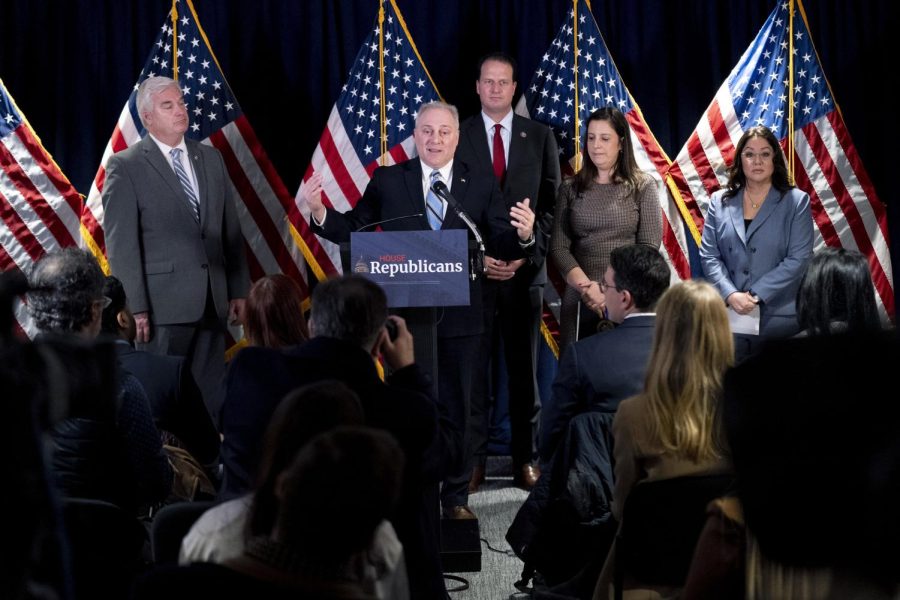Louisiana could see benefits from Scalise as majority leader
Associated Press/Andrew Harnik
House Majority Leader Rep. Steve Scalise, R-La., Scalise’s role as majority leader could be beneficial to his home district. Associated Press/Andrew Harnik
February 9, 2023
As the newly minted majority leader, Rep. Steve Scalise of Louisiana’s 1st Congressional District will have a decisive say over how federal funds are allocated in the new congress. This includes funding which could be sent to his own district, which is currently one of the largest recipients of federal assistance.
Following last year’s midterm elections, Republicans won a slim majority in the House of Representatives and elevated Scalise to serve as majority leader, the second highest position in the House of Representatives.
Louisiana’s 1st Congressional District includes parts of Orleans Parish, as well as the Northshore, Jefferson Parish, and coastal Southeast Louisiana. Republicans have represented the 1st Congressional District continually since 1977, most recently reelecting Scalise by a nearly 50-point margin.
As majority leader, Scalise has greater control over the legislative process that, according to local politicians from both sides of the aisle, could benefit Southeast Louisiana.
The role of the majority leader
Although the majority leader is not the head of the party, according to Loyola political science professor Sean Cain, they play a key role in conjunction with the speaker in partisan agenda setting.
“The majority leader in the House of Representatives, despite that title, is really the second in command in the majority party because the leader of the majority party is really the speaker of the house,” Cain said. “Many of the speaker’s responsibilities are shared with the majority leader’s, such as the party’s agenda, bills favor, relation with the other party, and the White House.”
Cain added that Scalise’s influence over committee appointments, his position within the party leadership, his fundraising abilities, and his position within the ideological center of the Republican party places him as the presumptive next-in-line to the speakership.
“Should there be a change in leadership, he would be the next in line to become speaker within his party,” Cain said.
‘Bringing home the bacon’
With Scalise’s senior position in the House, Cain said Louisianans should expect increased federal funding in the forms of loans and tax credits, formally known as ‘contingent liabilities’.
Delivering results to local districts is very important for party leaders, according to Cain. He said that focusing too much on national politics can result in party leaders being characterized as out of touch with the concerns of their voters and being voted out of office.
“Democrats prefer the former category [direct government grants], Republicans prefer contingent liabilities,” Cain said. “The 1st District and most of Louisiana are particularly well suited for contingent liabilities because in an area with a propensity for hurricanes, natural disasters, a common form of federal government relief for those are loans and tax credits.”
Cain said that he expects Scalise to use his position as majority leader to direct contingent liabilities towards Southeast Louisiana in order to keep himself ingratiated with the voters of the 1st District while he pursues his national agenda.
“The majority leader has to focus on policy-making not just for himself but also for many other Republicans who might be vulnerable. So he has to focus not only on bringing home the bacon to his home district but also helping vulnerable Republicans bring home the bacon so that they can get reelected,” Cain said. “So there is a certain danger of losing focus on your own particular constituency as you are trying to hold on to power through helping other members of Congress get reelected.”
Policymakers’ perspectives
State Senator Sharon Hewitt (R-Slidell), who is also running for governor this year, expressed optimism about Scalise’s role as majority leader as well as the positions of other Louisiana legislators.
“The Louisiana congressional delegation members all have really significant positions within the new congress as do our two senators,” she said. “We know that is going to help Louisiana directly with funding but also in terms of prioritizing legislation.”
Hewitt cited Scalise’s role in setting the legislative agenda in her hope for additional funding directed towards Louisiana. Hewitt also said that additional oil and natural gas leasing and funding for coastal restoration projects are initiatives she expects to be addressed.
State Senator Royce Duplessis (D-New Orleans) stressed his disagreement with Scalise on several policy issues including Scalise’s opposition to the Bipartisan Infrastructure bill and the creation of a second minority-majority Louisiana congressional district.
Still, Duplessis said he remains optimistic about having a Louisianian as majority leader and said that it might benefit Louisiana and New Orleans.
“Anytime the state of Louisiana, or specifically the city of New Orleans, can have someone like congressman Scalise, or anyone from the Louisiana delegation, to have the level of seniority and rank, that should be a good thing for Louisiana,” Duplessis said. “Because even with the division [in congress], there could be the opportunity to have discussions with someone with influence to direct resources to the place that we’re all supposed to be serving.”
Scalise declined to be interviewed by The Maroon.







